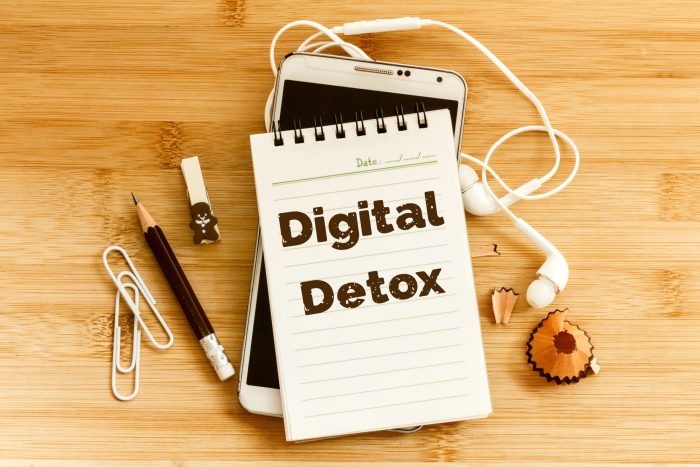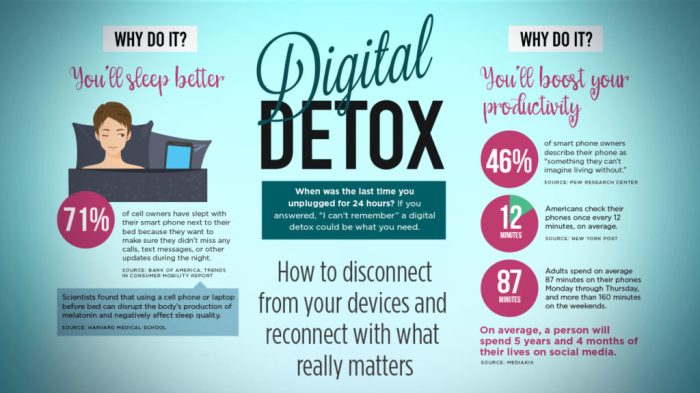Digital detox methods set the stage for this enthralling narrative, offering readers a glimpse into a story that is rich in detail with American high school hip style and brimming with originality from the outset. In a world dominated by screens, finding ways to unplug and prioritize mental well-being has become crucial. Let’s dive into the world of digital detox and explore the various methods that can help us reclaim a healthier lifestyle.
From social media detox to screen-free weekends, these methods offer a much-needed break from the constant digital noise, allowing individuals to reconnect with themselves and the world around them. Let’s discover the benefits of these practices and learn how they can positively impact our lives.
Introduction to Digital Detox Methods
Digital detox refers to taking a break from digital devices such as smartphones, computers, and tablets to reduce stress, improve focus, and reconnect with the real world.
It is essential to disconnect from technology periodically as the constant use of digital devices can lead to digital fatigue, sleep disturbances, and decreased productivity.
The Increasing Need for Digital Detox Methods
In today’s digital age, the need for digital detox methods is on the rise, with studies showing that the average person spends over 3 hours a day on their smartphone alone.
Research has shown that excessive screen time can have negative effects on mental health, leading to increased anxiety and depression.
By incorporating digital detox practices into our daily routine, we can improve our overall well-being and find a healthier balance between technology and real-life experiences.
Types of Digital Detox Methods
When it comes to digital detox, there are various methods that individuals can implement to reduce screen time and improve overall well-being. Each method offers unique benefits that can help individuals disconnect from technology and reconnect with the real world.
Social Media Detox
Social media detox involves taking a break from popular social networking sites like Facebook, Instagram, and Twitter. By limiting or eliminating social media use, individuals can reduce feelings of comparison, anxiety, and FOMO (fear of missing out).
- Benefits:
- Improved mental health
- Increased productivity
- Better sleep quality
Screen-Free Weekends
Screen-free weekends are dedicated to avoiding all screens, including smartphones, tablets, computers, and TVs. This method allows individuals to engage in offline activities, spend time outdoors, and connect with loved ones face-to-face.
- Benefits:
- Reduced eye strain
- Enhanced relationships
- Stress relief
Tech-Free Vacations
Tech-free vacations involve completely disconnecting from all digital devices while traveling or relaxing. By unplugging from technology, individuals can fully immerse themselves in the present moment, appreciate their surroundings, and reduce feelings of information overload.
- Benefits:
- Increased mindfulness
- Greater appreciation for nature
- Improved focus and concentration
“Digital detox methods can help individuals break free from the constant pull of technology and create a healthier balance in their lives.”
Implementing Digital Detox Methods

In today’s digital age, it can be challenging to disconnect from technology. However, implementing digital detox methods is crucial for maintaining a healthy balance in life. Here are some strategies to help you set boundaries with technology use and reduce screen time.
Setting Boundaries with Technology Use
Creating boundaries with technology is essential to prevent digital overwhelm. Here are some tips:
- Avoid using devices during meal times or family gatherings to foster real connections.
- Designate specific times in the day for checking emails and social media to avoid constant distractions.
- Turn off notifications to minimize interruptions and stay focused on tasks.
- Establish tech-free zones in your home, such as the bedroom, to promote better sleep.
Creating a Digital Detox Plan
Developing a digital detox plan can help you gradually reduce screen time and digital dependency. Here’s how to get started:
- Assess your current technology usage and identify areas where you can cut back.
- Set clear goals for your digital detox, such as limiting social media to 30 minutes a day.
- Replace screen time with healthy activities like reading, exercising, or spending time outdoors.
- Track your progress and make adjustments to your plan as needed for long-term success.
Gradually Reducing Screen Time and Digital Dependency
To gradually reduce screen time and digital dependency, consider the following strategies:
- Start by implementing small changes, such as turning off screens an hour before bedtime.
- Use apps or tools that track your screen time and provide insights on usage patterns.
- Engage in activities that do not involve screens, such as hobbies, exercise, or socializing with friends.
- Practice mindfulness and be present in the moment instead of constantly reaching for your devices.
Effects of Digital Detox

When it comes to mental health, digital detox can have a profound impact. By taking a break from screens and technology, individuals may experience reduced stress, improved mood, and better sleep patterns.
Potential Effects on Mental Health
- Decreased anxiety and feelings of overwhelm
- Enhanced ability to focus and concentrate
- Improved interpersonal relationships due to increased face-to-face interactions
Improving Productivity and Focus
- Eliminating distractions from notifications and social media can lead to increased productivity
- Enhanced ability to prioritize tasks and manage time effectively
- Increased creativity and problem-solving skills from allowing the mind to rest and recharge
Personal Testimonials, Digital detox methods
“After a week-long digital detox, I found myself feeling more present in the moment and less consumed by the constant need to check my phone. My productivity at work improved, and I felt more connected to my friends and family.” – Sarah
“I used to spend hours mindlessly scrolling through social media, but after implementing a digital detox routine, I noticed a significant improvement in my mental well-being. I now have more time for hobbies and self-care activities that truly bring me joy.” – Alex
